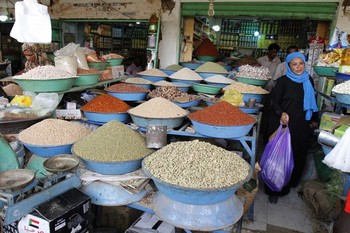Sudan’s monthly inflation rate declines to 12,44% in January
February 11, 2016 (KHARTOUM) – The Central Bureau of Statistics (CBoS) in Sudan announced that the monthly inflation rate has slightly dropped for the third consecutive month to reach 12, 44% in January compared to 12, 58% and 12, 8% in November.

It added that the 12 services and goods groups have impacted on the annual rate of change of inflation in varying proportions.
The annual rate of change in the telecommunications group has registered 52,54 points while the tobacco group registered 26,60 points and the restaurants and hotels groups 21,61 points.
The clothing and footwear group, for its part, registered 19,42 points and the entertainment and culture registered 19,19 points while the health group registered the lowest annual rate of change of inflation at 5,1 points.
The price index of the goods and services has registered 531,311 points in January 2016 compared to 527,29 points in December 2015 reflecting an increase of 3,72 points which amounts to 0.70%.
According to the bulletin, the price index of the food and drinks groups has registered 514,48 points in January 2016 compared to 519,93 points in December 2015 reflecting a decrease of 5,45 points which amounts to 1,05%.
Sudan’s economy was hit hard since the southern part of the country declared independence in July 2011, taking with it about 75% of the country’s oil output.
The Sudanese pound has lost 100% of its value since South Sudan’s secession, pushing inflation rates to record levels given that country imports most of its food.
Ordinary citizens continue to complain from cost of living increases that impaired their access to basic commodities.
(ST)
